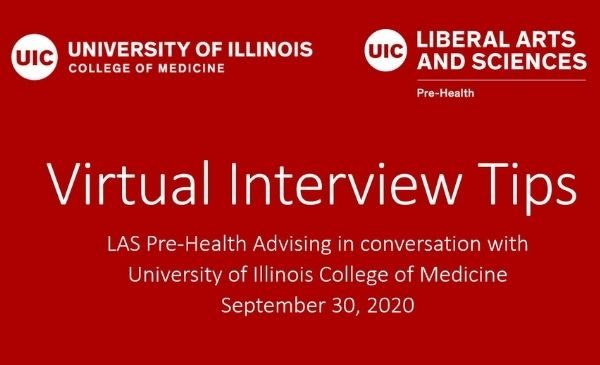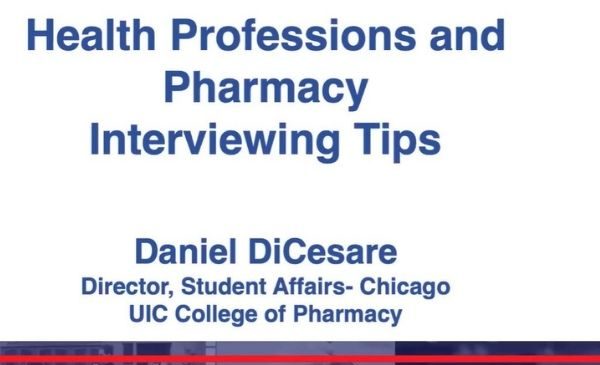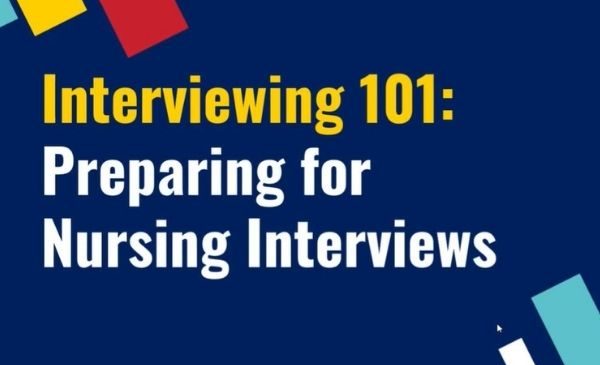Interviews & Mock Interviews
With the COVID Pandemic, health professions interview options are changing rapidly! Pre-Health Advising at UIC is trying to stay on top of those changes and we want to offer you some useful links and tips. In the page below, you will find helpful information from the American Dental Education Association (ADEA), the Association of American Medical Colleges (AAMC), and our own UIC colleagues. Mock interviews are available for students who have an interview scheduled with a health profession program and you are encourage to utilize this resource. And if you have more questions, don't forget you can make an appointment to talk with a pre-health advisor!
Health Professions Interview Tips
Want to hear tips about interviewing and virtual interviewing directly from the source? You’ve come to the right place! Pre-Health Advising has invited our UIC West Campus colleagues to join us in conversations about health professions interviews, particularly in a virtual environment. You are encouraged to watch all of the conversations as you may pick up tips regarding interviewing with a health professions program, even if you aren’t applying to that particular field.
Health Professions Interview Tips Links
Mock Interviews
Mock interviews with a full review are available for any current UIC students or alumni who have received an interview for medical school or a graduate health professions program. Applicants may only request a mock interview for advisor review if a professional school interview date has been secured.
Applicants may only request one mock interview for advisor review per application cycle.
Timing for Scheduling a Mock Interview:
Schedule a Mock Interview spot in iAdvise or Contact Pre-Health Advising at LASprehealth@uic.edu at least two weeks before your scheduled interview to request an in-person mock interview. During the busiest times of the academic year it may not be possible to schedule an in-person mock interview less than 2-3 weeks out.
Virtual Interview Tips & Suggestions
Styles of Interviews
Styles of Interviews
Every health professions school that requires or recommends interviews as a part of the admission process has it’s own style and schedule to it’s interview days. However, there are some general types of interviews that you may wish to be prepared for. It is also possible to encounter more than one type of interview during your interview day. Read through the interview invitation carefully as you should receive information about what to expect. Don’t be afraid to reach out to pre-health advisors if you have questions!
Individual Interview
This interview type is based in a one-on-one format. An applicant may have several individual interviews throughout the day with a range of stakeholders. You could meet with current students, basic science faculty, clinical faculty/practitioners, and/or admission professionals. Take each one seriously and expect to have questions tailored to each category of possible interviewer.
Within the individual interview, you may find that interviewers may or may not have specific information about your application. The descriptions below are common terminology provided in an interview invitation from a health professions school and will give you an idea of what to expect. Make sure to review your entire application (including supplemental or secondary application) prior to your interview regardless of type.
- Blind: This is a closed application interview. The interviewer has not had access to your application and may not know any information about an applicant beyond their name.
- Partial Blind: In this type of interview, the interviewer may have been provided basic information about an applicant or may have been able to read the personal statement and/or secondary application materials. Typically, the applicant’s GPA or standardized test scores are not available.
- Open: In an open interview, the interviewer has had access to the applicant’s entire application, including letters of recommendation, transcript, and standardized test scores.
Panel Interview
This interview is similar to an individual interview, but rather than one-on-one, the applicant interviews with two or more people at a time. The interviewers could be current students, basic science faculty, clinical faculty/practitioners, and/or admission professionals. Expect to have questions tailored to each category of possible interviewer.
With the panel interview you may find that interviewers may or may not have specific information about your application. The descriptions below are common terminology provided in an interview invitation from a health professions school and will give you an idea of what to expect. Make sure to review your entire application (including supplemental or secondary application) prior to your interview regardless of type.
- Blind: This is a closed application interview. The interviewer has not had access to your application and may not know any information about an applicant beyond their name.
- Partial Blind: In this type of interview, the interviewer may have been provided basic information about an applicant or may have been able to read the personal statement and/or secondary application materials. Typically, the applicant’s GPA or standardized test scores are not available.
- Open: In an open interview, the interviewer has had access to the applicant’s entire application, including letters of recommendation, transcript, and standardized test scores.
Group Interview
This type of interview is not commonly used by health professions programs. However, it is the type of interview used by UIC’s College of Nursing.
In a group interview, there are typically one to two interviewers who may be current students, basic science faculty, clinical faculty/practitioners, and/or admission professionals. There may also be as few as two or as many as five applicants being interviewed at the same time.
While each group interview set-up is different, it is common that the interviewers have a set list of questions. Typically, each applicant in the group interview is asked the same question(s). In this type of setting it is important to focus on specific examples that you can use to illustrate your response. It can be easy to get lost listening to the responses of the other applicants, so remain focused on your experiences and strong points. Pre-health advisors offer mock group interviews for UIC students invited to interview with the College of Nursing. Emails are sent out with registration information in the spring semester.
Multiple Mini Interviews
Each health profession program that utilizes Multiple Mini Interviews (MMI) will have their own format to both the interviews and the schedule of the day. In general, however, the multiple mini interview set up typically entails several interview stations. Applicants proceed through the stations and are assessed based upon the questions or scenarios presented at each station.
In most cases, MMI’s focus on situational questions that assess the applicant’s ability to articulate their thought process and judgement. The questions asked are often focused on issues such as communication, ethics, critical thinking, teamwork, or opinions on health care issues. In many cases there is not a “right” or “wrong” answer and applicants are expected to “show their work” (thought process, information they are using to come to a conclusion, etc.) in responding to the question. Typically, direct questions about an applicant are not asked and the MMI feels more like a role-playing experience. However, some schools use an adaptation or hybrid of this style.
Behavior-Based Questioning
Frequently used in the Multiple Mini Interview (MMI) set up, behavior-based questions can be asked in any type of interview setting. In behavior-based interviewing, questions typically revolve around real-world situations that the applicant may or may not be familiar with. As in the MMI, these types of questions are used to assess an applicant’s situational judgement and ability to articulate their thought process and decision making process.
In many cases with behavioral interview questions, the applicant is asked to share a personal experience to answer a question. Some examples are: How do you deal with conflict in a group setting? Tell me about a time you failed and how you addressed the situation.
In these cases, we recommend utilizing the S.T.A.R. technique:
- Situation: Use a specific example and describe a situation that you were in that relates to the question asked.
- Task: Explain the task or responsibility that you had to complete.
- Action: Describe the specific actions you took to complete this task.
- Result: Make sure to end your response with the results of your actions. What was the outcome?


